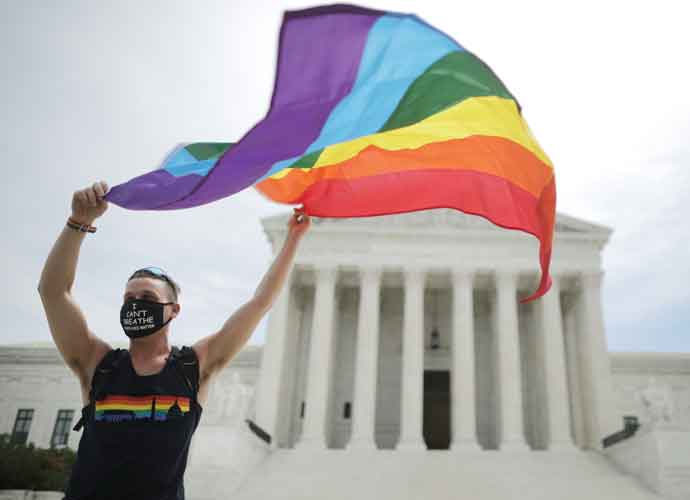

WASHINGTON, DC - JUNE 15: Joseph Fons holding a Pride Flag in front of the U.S. Supreme Court building after the court ruled that LGBTQ people can not be disciplined or fired based on their sexual orientation, Washington, DC, June 15, 2020. With Chief Justice John Roberts and Justice Neil Gorsuch joining the Democratic appointees, the court ruled 6-3 that the Civil Rights Act of 1964 bans bias based on sexual orientation or gender identity. Fons is wearing a Black Lives Matter mask with the words 'I Can't Breathe', as a precaution against Covid-19. (Photo by Chip Somodevilla/Getty Images)
On Tuesday, Supreme Court Justice Samuel Alito continued his criticism of the high court’s landmark same-sex ruling in a five-page statement that gave a detailed explanation as to why the court declined to hear a case that involved a Missouri lawsuit.
The case, Missouri Department of Correction v. Jean Finney, involved a dispute when jurors who voiced religious concerns about same-sex marriage were dismissed from an employment discrimination case.
In his statement, Alito agreed with the Supreme Court’s decision not to hear the Missouri lawsuit. However, he said he believed it “exemplifies the danger” he anticipated in the 2015 Obergell v. Hodges case.
He further explained, “Namely, that Americans who do not hide their adherence to traditional religious beliefs about homosexual conduct will be “labeled as bigots and treated as such by the government.”
Alito wrote that the way Obergefell v. Hodges written in 2015 “made it clear that the decision should not be used in that way.”
In 2015, the high court voted 5-4 in favor of allowing same-sex couples the right to marriage, with Alito dissenting. At the time, Chief Justice John Roberts and fellow conservative Justices Antonin Scalia and Clarence Thomas were alongside him dissenting.
In the matter of the case, the court rejected to hear on Tuesday, Finney was an employee at the Missouri Department of Corrections (DOC) and claimed that after she started a same-sex relationship with a co-worker’s former spouse, the co-worker in question proceeded to make her life intolerable. She sued the Missouri DOC and the department for the co-worker’s actions.
Finney’s lawyer, as part of jury selection, asked jurors about their religious beliefs as they relate to sexuality. Finney’s lawyer sought to strike jurors based on that question, which prompted a lawsuit that alleged religious discrimination.
Alito argued that while he “reluctantly” agreed the Supreme Court should not take up the case (as requested by the Office of the Missouri Attorney General), he still expressed concerns about the effects of the 2015 decision on this case and future cases.
Justices Alito and Thomas have frequently encouraged the court to overturn the same-sex marriage ruling. Alito was key in orchestrating the reversal of Roe v. Wade in 2022.
Bill Belichick's girlfriend Jordon Hudson, 23, set social media on fire with her latest post…
A mysterious illness has killed more than 60 people in northwest Democratic Republic of Congo…
Zach Wilson recently responded to fiancée Nicolette Dellanno's bachelorette trip in Cabo San Lucas, Mexico, with a…
The wealthy tech leaders Elon Musk, Jeff Bezos and Mark Zuckerberg, who attended Donald Trump's second presidential inauguration, have since lost…
The U.S. Department of Agriculture (USDA) temporarily stopped funding the University of Maine System (UMS) after…
Jaelynn Chaney, a plus-sized travel blogger, hit back at "fat phobic" critics who believe she…